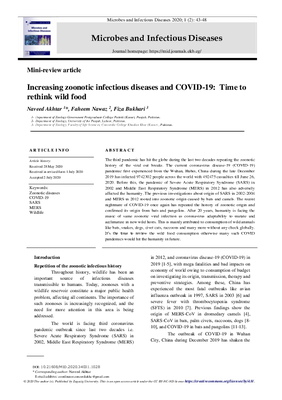Increasing zoonotic infectious diseases and COVID-19: Time to rethink wild food
The third pandemic has hit the globe during the last two decades repeating the zoonotic history of the viral out breaks. The current coronavirus disease-19 (COVID-19) pandemic first experienced from the Wuhan, Hubei, China during the late December 2019 has infected 9742302 people across the world with 492475 casualties till June 26, 2020. Before this, the pandemic of Severe Acute Respiratory Syndrome (SARS) in 2002 and Middle East Respiratory Syndrome (MERS) in 2012 has also adversely affected the humanity. The previous investigations about origin of SARS in 2002-2004 and MERS in 2012 rooted into zoonotic origin caused by bats and camels. The recent nightmare of COVID-19 once again has repeated the history of zoonotic origin and confirmed its origin from bats and pangolins. After 20 years, humanity is facing the music of same zoonotic viral infection as coronavirus adaptability to mutate and acclimatize in new wild hosts. This is mainly attributed to consumption of wild animals like bats, snakes, dogs, civet cats, raccoons and many more without any check globally. It’s the time to review the wild food consumption otherwise many such COVID pandemics would hit the humanity in future.
https://biodiversitylinks.org/learning-evidence/wild-meat-collaborative-learning-group/evidence-collection/evidence-inbox/increasing-zoonotic-infectious-diseases_wild-meat.pdf/view
https://biodiversitylinks.org/learning-evidence/wild-meat-collaborative-learning-group/evidence-collection/evidence-inbox/increasing-zoonotic-infectious-diseases_wild-meat.pdf/@@download/image/image.png
File
Increasing zoonotic infectious diseases and COVID-19: Time to rethink wild food
Author(s):
Akhtar, Naveed
,
Nawaz, Faheem
,
Bukhari, Fiza
Publication Date: 2020
Location: Global
DOWNLOAD FILE
The third pandemic has hit the globe during the last two decades repeating the zoonotic history of the viral out breaks. The current coronavirus disease-19 (COVID-19) pandemic first experienced from the Wuhan, Hubei, China during the late December 2019 has infected 9742302 people across the world with 492475 casualties till June 26, 2020. Before this, the pandemic of Severe Acute Respiratory Syndrome (SARS) in 2002 and Middle East Respiratory Syndrome (MERS) in 2012 has also adversely affected the humanity. The previous investigations about origin of SARS in 2002-2004 and MERS in 2012 rooted into zoonotic origin caused by bats and camels. The recent nightmare of COVID-19 once again has repeated the history of zoonotic origin and confirmed its origin from bats and pangolins. After 20 years, humanity is facing the music of same zoonotic viral infection as coronavirus adaptability to mutate and acclimatize in new wild hosts. This is mainly attributed to consumption of wild animals like bats, snakes, dogs, civet cats, raccoons and many more without any check globally. It’s the time to review the wild food consumption otherwise many such COVID pandemics would hit the humanity in future.


